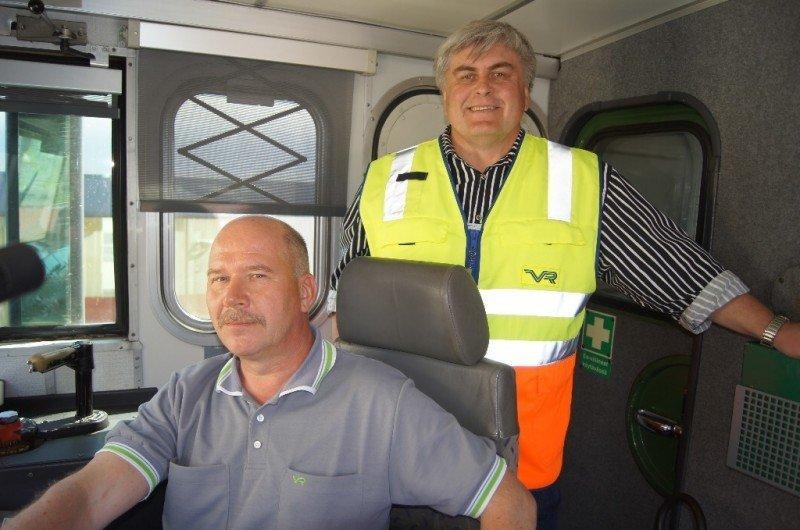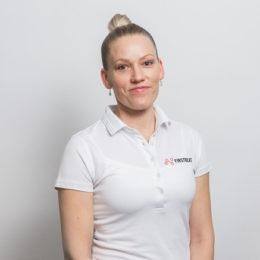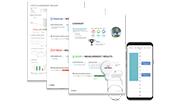
42 train drivers of Finnish National Railways undertook a three-day Firstbeat Lifestyle Assessment in autumn 2012 as part of a well-being campaign. The effects of challenging rotational shiftwork were visible on the Lifestyle Assessment reports but less than anticipated.
The VR Group’s success depends on the skills and wellbeing of its personnel, states The Finnish National Railways, VR in its official corporate responsibility statement.
“In the VR Group the work is irregular and done in shifts. Our role is to be active in investigating how to make it easier to manage,” says the Manager of Well-being Liisa Ilvesmäki-Saarinen.
VR established a well-being program to evaluate the physical load and recovery from work while also supporting the well-being of train drivers. A three-day Lifestyle Assessment was conducted in autumn 2012 to map the stress and recovery of 42 train drivers.
The most significant observations that were common to the whole group were moderate recovery, lack of physical exercise and overweight. A majority of the group was able to improve their well-being by making minor but significant changes in their daily lives.
Ilvesmäki-Saarinen is worried about the lack of exercise of VR Group’s employees, which has also been reported in other well-being programs of the company.
“It is possible for us at VR to support physical activity but a person’s inner motivation is what counts,” says Ilvesmäki-Saarinen.
Motivation from Personal Feedback
Everyone that participated in the Lifestyle Assessment received personal feedback from Heli Soininen, an occupational physiotherapist of a local healthcare provider Terveystalo.
“Individual feedback is rewarding. I consider it a vital part of the analysis. Personal feedback is what motivates and drives for changes,” says Soininen.
Those employees who took part in the Lifestyle Assessment and whose results suggested a need for follow-up actions received invitations to a nutritionist, occupational physiotherapist or occupational healthcare. Each one was given an opportunity to take part in a lecture series about nutrition. In near future VR is also planning to start a weigh management group.
“19 of the train drivers were invited to a follow-up control and measurement. We have been able to create good results with them, especially in regards of increasing physical activity. That also has a positive impact on weight management and recovery,” says Soininen.
Measurement and the following actions evidently increased the train drivers’ attention towards improving well-being. For example, some after work exercise sessions were scheduled due to the growth of interest.
“The people are quite excited about their assessment results and have been asking for a follow-up. We have found the project very successful. Our employees have started to see their daily lives and habits in a new light,” says the Manager of Pieksämäki Train Operations Jan-Erik Westerlund.
Westerlund was happy to notice how the measurement showed the direct influence of his own actions. Despite feeling that he slept well, the results did not always support this. Reasons for this were often found from the journal entries and daily habits.

More Attention to Sufficient Recovery
Train operations at Pieksämäki have a lot of cargo deliveries and more changing shifts than in passenger services. Work is done round-the-clock and the change of shifts and working hours can be very stressful.
“The effects of shift work were visible in numerous assessment reports but there were also many, especially younger train drivers who were able to recover well from their work. For older workers the influence of age on recovery was also visible,” says Soininen.
Westerlund estimates that those who have been working as train drivers for many years have realized the effects of shift work and learned to adjust their own actions accordingly. With younger workers, a strict recruiting process and thorough guidance might have been the reasons behind positive recovery results.
The heart rate variability based quality of recovery was good or moderate for most of the train drivers and the recovery index for the entire group was 62, which indicates that majority of the night was positive in terms of recovery. However, none of the employees had a clean record and as a whole the group’s recovery was on moderate level.
“The group report included in total 23 days of weak recovery. Rest and recovery are important issues which require continuous attention in shift work,” states Soininen.
“The Firstbeat Lifestyle Assessment gives food for thought, and according to my experience delivers good results. Instead of focusing only on physical fitness, it gives a much broader point of view. With the help of Firstbeat Lifestyle Assessment, we have been able to provide the right type of support and help that our employees need,”commends Liisa Ilvesmäki-Saarinen.
Picture: Train Driver Raimo Nikulainen and Manager of Pieksämäki Train Operations Jan-Erik Westerlund took part in Firstbeat Lifestyle Assessment. Photo: Liisa Tanninen
If you liked this article, you should subscribe to our mailing list
You might also be interested in

Healthy Lifestyle is Crucial in Shift Work
Firstbeat Lifestyle Assessment database suggests that especially during the night’s sleep a shift worker’s recovery is significantly reduced.

Information on Individual Well-Being Promotes Coping at Work
General feedback on the employee well-being was relieving: The staff is coping normally which provides good grounds for further wellness development.

Work-Life Integration – How to Maintain Focus and Energy in a Volatile World
Join us in our webinar and hear Simon Shepard, Optima-Life, share his experiences from promoting wellbeing and top performance in the workplace.


